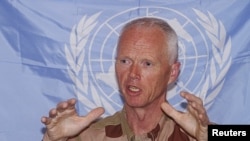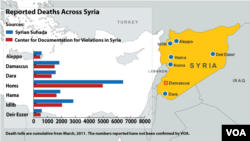Escalating violence in Syria forced some 300 unarmed United Nations observers to suspend their mission Saturday.
The head of the mission, Major General Robert Mood, said observers will not leave the country but "will remain in place."
"In this high-risk situation, UNSMIS is suspending its operations. U.N. observers will not be conducting patrols and will stay in their locations until further notice," he announced. "Engagement with the parties will be restricted. This suspension will be reviewed on a daily basis and operations will resume when we see the situation fit."
Syrian opposition officials meeting in Istanbul, including the Syrian National Council's Bassam Imadi, said the decision comes as no surprise.
"I think they are right to do so," he said. "And I think it is also high time to announce that the mission has failed - even the whole initiative of Mr. Annan has failed.''
The Syrian government also responded, saying it understood the decision, blaming the violence on forces it described as "terrorists."
More violence
Meanwhile, amateur video posted on the Internet Saturday showed more violence, including what appeared to be evidence of heavy fighting in a suburb of the capital of Damascus and heavy shelling in the central province of Homs.
Syrian activists reported at least 50 people killed in clashes and shelling in several Syrian cities Saturday.
The U.N. sent its observers to Syria to monitor the implementation of a six-point peace plan and cease-fire brokered by U.N. and Arab League Envoy Kofi Annan. But the cease-fire has never taken hold and several days ago a group of observers came under attack when it went to visit the town of al-Haffeh in Latakiya.
U.N. observer teams have also been targets of roadside bombs. Although no one was killed or seriously wounded, U.S. Ambassador to the U.N., Susan Rice, said the observers were "one [explosion] away from a disaster."
Decisions
The U.N. Security Council must decide whether to renew the mission by July 15.
The decision to suspend observer operations leaves questions about what happens next. In Washington Saturday, a White House spokesman said the United States was consulting international partners on the "next steps."
In Turkey Saturday, Foreign Minister Ahmet Davutoglu called on the U.N. Security Council to act immediately, not allowing "the extension of this human tragedy," and take new measures.
Syrian National Council Political Chief Burhan Ghalioun, in Istanbul, said he was not ready to give up all hope but agreed the U.N. must change tactics.






